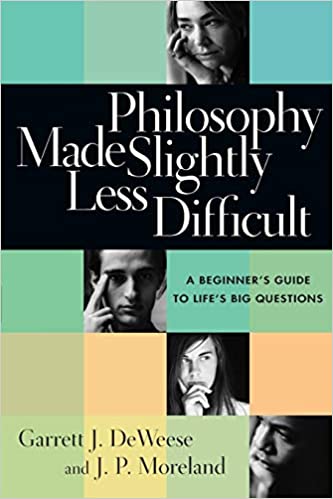A Brief Book Summary from Books At a Glance
by Steve West
About the Authors
Garrett DeWeese and J. P. Moreland teach at BIOLA University and the Talbot School of Theology. They are the authors of numerous books and articles.
Introduction
This book provides an accessible introduction to the major topics and subject areas of philosophy. Written by two leading Christian philosophers, the book is an excellent resource for readers of philosophy at all levels. Difficult technical discussions are handled succinctly without sacrificing accuracy. It is a solid introductory work.
Table of Contents
Chapter 1 Where Do I Start?
Chapter 2 What is Real?
Chapter 3 How Do I Know?
Chapter 4 How Should I Live?
Chapter 5 What Am I?
Chapter 6 How Should Christians Think About Science?
Chapter 7 Where Do I Go From Here?
Summary
Chapter 1: Where Do I Start?
Christians are confronted with intellectual objections to their faith, and in order to respond to them, they require the ability to think philosophically. Everyone engages in philosophy in basic ways: Philosophy is thinking critically about questions that matter. Philosophy deals with large issues of value, knowledge, and being. Not every Christian will be a professional philosopher, but understanding the basics of philosophy is very helpful for serving the Lord in today’s society.
The laws of logic depend on the existence of God (if he did not exist, nothing would exist). Logic is not an arbitrary social construct; everyone uses it in daily life. The three fundamental laws of thought are the law of identity, the law of noncontradiction, and the law of the excluded middle. These laws cannot be disproven because any disproof would rely on them. They are fundamental for theology: God is who he is, and there are things that are true or false about him.
In deductive reasoning, if the premises are true (sound) and they are placed in a proper logical form (validity), then the conclusion must follow. Those who accept the truth of an argument believe it is cogent; cogency is person-relative and depends on numerous factors. There are a number of deductively valid forms for an argument, and there are also numerous formal and informal logical fallacies. There is an almost infinite number of ways to construct fallacious arguments. God is not well-served by illogical arguments and sloppy thinking. Inductive arguments do not have the same kind of logical certainty that deductive arguments generate. Given the truth of the premises, inductive thinking produces conclusions that are judged according to probability. There are a variety of types of inductive arguments.
In order to have coherent and meaningful philosophical arguments, it is important to have clear definitions of terms and engage in proper conceptual analysis. From a Christian perspective, one of the reasons philosophy is so important is that it helps us understand worldviews. Worldviews help determine whether or not we believe an argument is cogent. Philosophy often goes a long way to setting the issues that theology needs to deal with in contemporary society. There is an overlap in intellectual methods between theology and philosophy—the best theological thinking shares the trademarks of proper philosophical thought. . . .
[To continue reading this summary, please see below....]The remainder of this article is premium content. Become a member to continue reading.
Already have an account? Sign In
